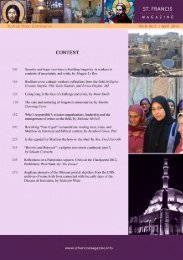download the pdf - St.Francis Magazine
download the pdf - St.Francis Magazine
download the pdf - St.Francis Magazine
You also want an ePaper? Increase the reach of your titles
YUMPU automatically turns print PDFs into web optimized ePapers that Google loves.
<strong>St</strong> <strong>Francis</strong> <strong>Magazine</strong> Vol 8, No 4 | August 2012<br />
blame o<strong>the</strong>rs when problems arise. When members ask questions<br />
beyond <strong>the</strong> scope and understanding of <strong>the</strong> pastor or teacher, <strong>the</strong><br />
assimilation and accommodation process shuts down in an effort to<br />
stabilize core beliefs. This rigidity reflects a defense mechanism in<br />
light of perceived threats of trauma and humiliation.<br />
10 Conclusion<br />
We discovered that self-centered shame and its dominance in <strong>the</strong><br />
collective mind of Iranians (and some o<strong>the</strong>r BMBs) help to explain<br />
<strong>the</strong> inability to differentiate between a minor offense to be overlooked<br />
or a major offense that needs to be addressed. Introducing<br />
o<strong>the</strong>r-centered guilt as an element of <strong>the</strong> discipleship process is<br />
more easily said than done. Fear stored in <strong>the</strong> memory dominates<br />
and controls thinking. Deeply embedded cultural distrust can explain<br />
<strong>the</strong> process of self-preserving and o<strong>the</strong>r-annihilating behavior<br />
as a survival mechanism under perceived threats of trauma and humiliation.<br />
Discipleship will have to address fears, real or perceived,<br />
and help <strong>the</strong> Iranian Christians work through <strong>the</strong> emotional element<br />
of distrust so <strong>the</strong>y do not become rigid and extremely resistant<br />
to change, losing complexity, becoming entrenched in what<br />
is ‘right’, and avoiding humiliation. <strong>St</strong>ructures, though <strong>the</strong>y may<br />
have <strong>the</strong> correct form, may not reflect <strong>the</strong> operational paradigm<br />
dominant within <strong>the</strong>ir culture. Discipleship will need to understand<br />
and evaluate functional paradigms of power and help <strong>the</strong> nascent<br />
community grow in responsibility and participation. None of <strong>the</strong>se<br />
core cultural values will change immediately. Patience, love, wisdom<br />
and a long-term commitment to see maturity through <strong>the</strong> discipleship<br />
process is what is needed.<br />
The purpose of this article has been to investigate aspects of Iranian<br />
culture and worldview that influence relations within <strong>the</strong> Iranian<br />
churches. Specifically I have tried to identify some key areas of<br />
concern in relation to <strong>the</strong> category of emotion that I believe are<br />
sources of tension and strife within <strong>the</strong> churches. Therefore, any<br />
adequate discipleship program offered to/by Iranian Christians<br />
must in some form address <strong>the</strong>se issues. All cultures have experienced<br />
<strong>the</strong> corrupting influence of sin in different manners; this is<br />
<strong>St</strong> <strong>Francis</strong> <strong>Magazine</strong> is a publication of Interserve and Arab Vision 429







![Reflections on Surah Fatiha and the Lord's Prayer[1] - St.Francis ...](https://img.yumpu.com/49377951/1/184x260/reflections-on-surah-fatiha-and-the-lords-prayer1-stfrancis-.jpg?quality=85)









